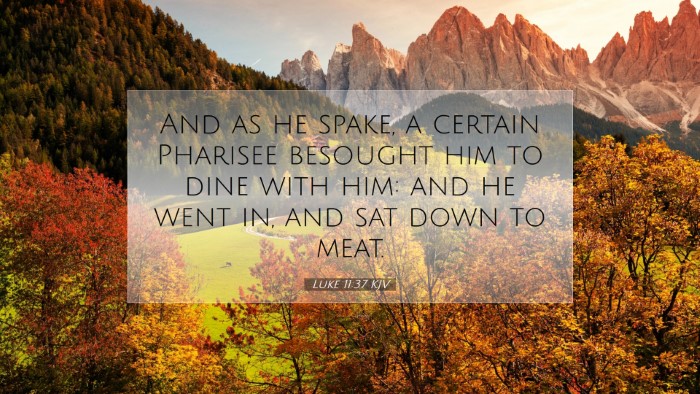Commentary on Luke 11:37
In this verse, we find Jesus dining at the house of a Pharisee, which opens a window into the tension between the religious leaders of the time and the ministry of Jesus. This meal not only serves as a backdrop for profound teaching but also highlights the spiritual insights of biblical figures such as Matthew Henry, Albert Barnes, and Adam Clarke. Below, we summarize their thoughts on this passage.
Contextual Background
Luke 11:37 states: "And as he spake, a certain Pharisee besought him to dine with him: and he went in, and sat down to meat." This moment illustrates the social dynamics of the time, where a Pharisee, representing a strict adherence to the law, invites Jesus, who often challenged the religious status quo.
Insights from Matthew Henry
Matthew Henry emphasizes several key points regarding this verse:
- Invitation of Jesus: Henry notes the significance of the Pharisee's invitation. It reflects both an opportunity for fellowship and a temptation for confrontation. The Pharisee's desire to dine with Jesus indicates a recognition of His influence, yet it also indicates potential motives of scrutiny.
- Jesus' Response: The act of Jesus accepting the invitation shows His openness to engage with those who stand opposed to Him. It exemplifies His ministry’s reach, demonstrating that He does not shy away from association with the religious elite.
- Lessons of Humility: Henry points out that Jesus’ presence at this meal serves as a lesson in humility for both the Pharisee and the onlookers. Jesus does not conform to the ceremonial laws observed by the Pharisees, emphasizing the heart's condition over outward rituals.
Insights from Albert Barnes
Albert Barnes provides additional reflections on this verse:
- Pharisaical Invites: Barnes observes the dual purpose of the Pharisee’s invitation, noting that while it was a gesture of hospitality, it was also a calculated move to assess Jesus' character and doctrine.
- Purpose of the Meal: He points out that meals in the Jewish context were significant and symbolic acts of fellowship, and Jesus’ acceptance of the invitation illustrates His commitment to reach out to all, including those who may oppose Him.
- Implications for Ministry: Barnes emphasizes that pastors and scholars should reflect on this encounter as a model for ministry, where engaging with differing beliefs can bring about opportunities for teaching and edification.
Insights from Adam Clarke
Adam Clarke offers a slightly different perspective, focusing on the implications of this narrative:
- Analysis of the Setting: Clarke points to the cultural significance of the meal, emphasizing that social gatherings were integral to the community but often laced with moral judgments, especially from Pharisees.
- Teachings about True Purity: He elaborates on how Jesus’ interaction at this meal serves as a precursor to discussing true purity and righteousness. Clarke argues that the Pharisees were more concerned with outward cleanliness than the purification of the heart.
- Reflective Practice: Clarke posits that scholars should consider the moments in which they, too, engage with societal elites. How can one exemplify the teachings of Jesus in such scenarios, guiding discussions towards deeper spiritual truths?
Theological Significance
This verse and its surrounding context provide profound theological insights:
- Outreach to Sinners: Jesus' willingness to dine with the Pharisee reminds us of His mission to save the lost and calls believers to engage with the world around them, regardless of reputation or societal norms.
- Spiritual Discernment: The event highlights the need for spiritual discernment. Just as Jesus was invited into a space of scrutiny, Christians today are called to navigate their relationships with wisdom, recognizing opportunities to witness for Christ.
- Challenge of Ritualism: Jesus challenges ritualistic practices that bind the heart and prevent true worship. This invites congregants and leaders alike to ensure their worship is sincere, focusing on relationship over mere rule-following.
Final Reflections
In conclusion, Luke 11:37 encourages pastors, students, and scholars to reflect on their own approaches to reaching out to others, regardless of their background or beliefs. By embracing the lessons from Henry, Barnes, and Clarke, readers can foster a deeper understanding of Christ's ministry and purpose.


